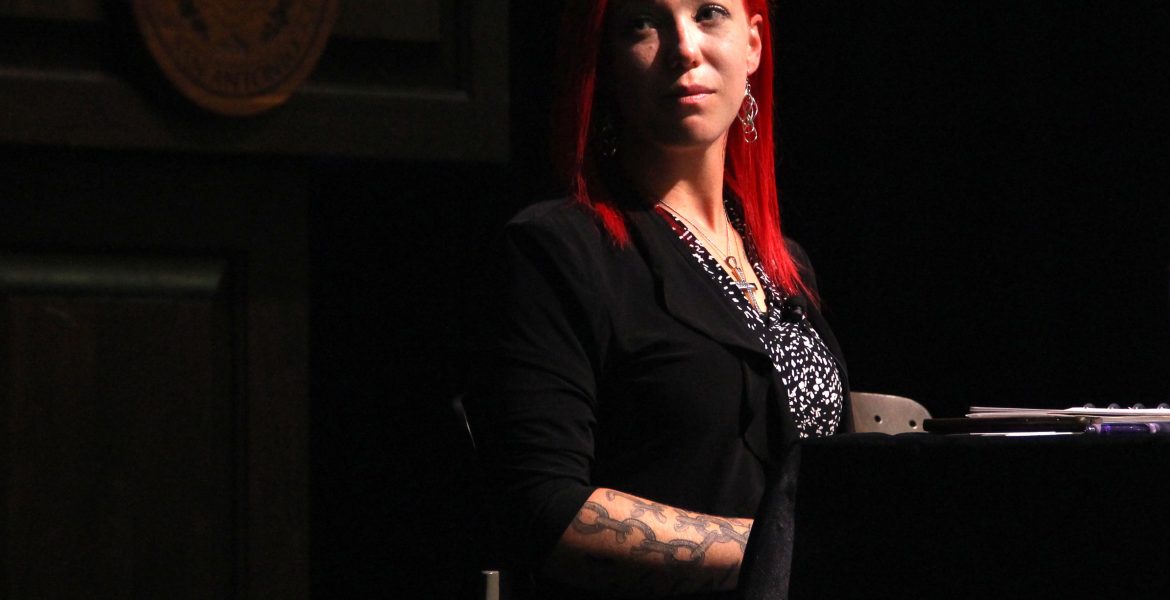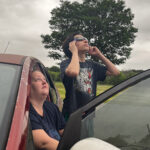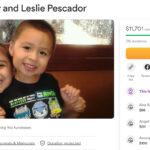Exposed to drugs, violence and sexual assault at an early age, Karla Solomon found herself exploited as a child and trafficked as an adult.
Solomon, 34, described the trauma that stayed with her Jan. 30 at the South Texas Human Trafficking Prevention Panel at Texas A&M University-San Antonio.
“I would cry and shake for hours on end,” Solomon said. “It just wouldn’t stop, and it was mainly because of the memories that just tormented me to where I couldn’t function.”
The memories of being trafficked affected Solomon so bad that she attempted suicide by taking a whole bottle of anxiety medication. While waiting to die, she received a phone call from a friend who prayed with her.
“I like to tell people that that was the day that I tried to throw in the towel and God threw it back in my face and told me, ‘Remember you got work to do,’” Solomon said. “So, I go around now and I share my story.”
Solomon said she hopes her story inspires others to learn the signs that someone might be a trafficking victim.
Texas State Sen. Pete Flores, who also served on the panel, acknowledged Solomon’s bravery after she told her story.
“What strength we just witnessed minutes ago,” Flores said, noting that many crime victims refuse to let the crime define them.
“What is defining you is strength and bravery,” he told Solomon, “and stepping forward to make sure that others don’t follow or to be a victim.”
Trafficked as an adult
After years of early violence and abuse, Solomon had found happiness and stability. She was going to college for business, working full-time as a general manager for McDonald’s and living with her husband and their three children. However, when he started work on oil rigs, it caused her a lot of stress.
In the summer of 2016, the combination of her work, being a mother and a student drove Solomon to run away.
“I did the one thing that I knew how to do really good,” Solomon said. “I ran. But I ran away from my kids. I ran away from my husband. I ran away from everything and everybody that I knew. And I went to hide somewhere.”
Solomon traveled to Baton Rouge, Louisiana, where she lived alone and did as she pleased.
There she met a man who would flip her life upside down once again.
At first everything was perfect, Solomon said. He would take her to places she had never been and gifted her with expensive shoes and purses.
“During this whole time, he’s learning all this stuff about me, I never once thought about why I didn’t know anything about him,” Solomon said. “I didn’t even know his real name. But it was too good to be true and I didn’t want to lose that.”
After a long conversation about loyalty, honor and respect one night, the man introduced her to his world, Solomon said. He took Solomon to a hotel on a bad side of Baton Rouge to pick up a girl.
“She walked out of the hotel room with a long red wig on,” Solomon said. “She probably was about 16 years old. She had fishnet stockings on and really high high-heels. She gets into the car and sits in the backseat. She hands him a phone that had a GPS location pulled up and he told me to drive.”
Solomon drove them to the GPS location. When they arrived, the man told her where to park and when to turn the headlights off. The young girl was the only one to leave the car and enter the building.
She came back about 20 minutes later, got in the car and gave him money, Solomon said. They did this every night, all night long into the early morning until one night when the young girl came back to the car without any money.
The man made Solomon drive to an abandoned location. He pulled the young girl out of the car and beat her as punishment. He then forced Solomon to leave the girl behind.
“I didn’t want to get out of the car and go help her because I didn’t know how I would help her,” Solomon said. “I didn’t want to get hurt myself. I was scared… he made me leave her there, broken and bloody on the floor, on the concrete right next to the swamps. I still, to this day, do not know what happened to her.”
When they returned to their hotel, he created an ad on Backpage, a classified advertising website for buying and selling sex. Solomon was instructed to dye her hair blonde after he posted the ad with images that were not her.
He told Solomon she would only have to perform sexual acts one time which turned into another and another. She soon had a $1,500 per day quota that she was expected to reach. If she didn’t, she would have to endure punishment involving her being taken to secluded locations where she would be forced to perform sexual acts.
The man also convinced her to take methamphetamine.
“He told me that it would make me not feel, and because of what was going on, that sounded like a good idea. It didn’t take much and I was completely addicted to the drugs and would do anything for them.”
Solomon, the man and two other girls who were being trafficked traveled to towns where people had placed ads on Backpage, staying for two to three days before moving on.
Finally, Solomon had enough and tried to escape after the man broke her ribs as punishment for shutting a door.
“When we were in Houston, I tried to run,” Solomon said. “I didn’t get very far though.”
Her trafficker realized she had fled and threatened her with calls and text messages. Solomon returned after receiving videos of her daughter getting on and off the school bus. He threatened to traffick her daughter if she did not return, Solomon said.
Solomon called her husband and revealed the truth about her whereabouts and the threats that had been made to their daughter.
“I finally reached out to my husband and told him what was going on,” Solomon said. “The last thing that I told him was, ‘I’m going back to protect my daughter, just please keep her safe.’”
She received a new quota of $2,500 per day and was not allowed to refuse anything by customers, Solomon said.
“Whatever call came through on that ad, I had to take,” Solomon said.
Rescue and resolution
Solomon was addicted to methamphetamine and weighed around 100 pounds. She could feel every bone in her body, which was sore and battered from the sexual abuse.
One night, Solomon sat in a bathtub rummaging through her things, looking for any sign of hope.
“I was sitting in the bathtub going through my stuff and I found this cross necklace,” Solomon said. “…I lifted my head up to the heavens and said, ‘God, I can’t take this anymore.’”
Three days later, she was rescued while leaving a Marriott hotel in College Station.
Her husband had contacted local law enforcement, who began working closely with Homeland Security and the FBI to find her.
“I was walking out of the hotel and heard people behind me shouting, ‘Karla! Karla Solomon, stop,’” Solomon said.
She hadn’t recognized her name after being known as “Alexia the Australian Princess” through her Backpage ads.
Solomon was taken to the hospital where it was determined that she had several broken ribs and multiple STDs. But the emotional and psychological scars were much deeper.
She was so traumatized from the memories of being trafficked, she could not look anyone in the eyes, Solomon said.
After a failed suicide attempt, Solomon found comfort in her faith. She used her conviction to start advocating against trafficking.
As for the man who trafficked Solomon, she cooperated with law enforcement to build a case against Herman Henry Fox, the real name of the man whom she once thought too good to be true.
In February 2018, Fox took a plea offer for 30 years, which he is serving in the Texas state prison system.
Childhood trauma foreshadows troubles as an adult
Growing up, Solomon experienced sexual abuse, drug addiction, exploitation and pregnancy all by the age of 15.
After family members discovered she had been sexually molested, she was removed from her mother’s care, Solomon said. She was placed with her aunt, who adopted her, until Solomon became rebellious at 11 years old and was dropped off at her mother’s home.
Troubles continued. She said her mother and stepfather smoked crack and became violent, leading her to run away.
While living on the streets, she met an older woman, Charlotte, who was like a mother figure to her, Solomon said.
Charlotte took Solomon to parties with older men and introduced her to drugs and sex. At one of the parties, she lost her virginity. Solomon was devastated but Charlotte celebrated the act.
“She celebrated the fact that I had lost my virginity in such a horrible way because she said that now it is out of the way, we can get down to making real money,” Solomon said.
She took Solomon to trap houses and got her addicted to crack cocaine at just 12 years old.
Solomon was returned to her mother after police determined she was a runaway from a nearby town. But she just ran away again.
Living on the streets at 12, Solomon used sex as a tool to survive.
“It became very normal for me to have sex as a survival skill in order to have a place to stay, in order to have dinner to eat that night,” Solomon said.
Solomon got pregnant at 14 years old. She was offered a home by her aunt, only if she were to get an abortion. Solomon refused. Instead, she lied to a man and told him the child was his in order to have a place to stay during her pregnancy.
After the child’s birth, the man realized Solomon’s son was not his. He became violent and nearly killed her, she said. To protect herself and her child, she ran again.
Mission for advocacy
Dana Michea Marquez, a communication senior and event organizer of the South Texas Human Trafficking Prevention Panel, said Solomon serves as advocate for survivors and works with the Magdalene House in Kerrville, a two year residential community serving women who have been victimized by trafficking, prostitution, addiction and abuse.
“She’s very active in the community as a positive, healthy survivor and what she does,” Marquez said. “Knowing how far she’s come and knowing she’s also okay with sharing her story versus those that still have that healing to go through to be able to share their story.”
Marquez hopes that people will take away awareness from Solomon’s story.
“It’s open conversation because it’s not talked about enough,” Marquez said. “A lot of people think ‘Oh, that is extreme. That won’t happen to me.’ When in fact San Antonio is one of the top five cities in the nation for human trafficking.”
Solomon hopes her story educates people and inspires victims to seek help.
“That’s all part of my mission,” Solomon said. “If I could just educate one person, if I just help one person in my lifetime by sharing my story that’s enough for me.”
Advice from a survivor
Solomon encourages victims to not be afraid to come forward with their stories. Statistics show that one in every three females has been abused sexually or physically, Solomon said.
“Sometimes you just feel that you have no other choice or have no other way out,” Solomon said. “And I think that the biggest thing that girls and teenagers and boys and just anybody that’s in that life needs to know is that there are people out there that can help; there are people out there that understand and that they’re not alone.”
Human and sex trafficking affects people from all backgrounds. The crime does not discriminate, Solomon said.
The LBGTQ community is a big target by predators, Solomon said in an interview after the panel.
“Which is a shame and horrifying in itself but I personally have seen plenty of boys and men out there as well as children, women, teenagers,” Solomon said. “It is non-discriminative. It is any race, any age, any color, it does not matter. They do not care. You are a piece of product that they are trying to sell just like Walmart does.”
Solomon warns to not approach someone you suspect is being trafficked. She described “a very real underlying danger that you are not aware of, and I’ve seen it firsthand.”
According to Solomon, when approaching a possible victim and trafficker there is potential danger that you are bringing upon the victim and yourself. A victim or trafficker can possibly hurt you and anyone with you.
The most important thing to do is file a report with as much information as you can gather, including the direction the suspects are heading, thorough descriptions of what they look like and how they are dressed, Solomon said.
There are various warning signs to look for when suspecting trafficking, including unexplainable expensive gifts, drug use, physical bruising and lack of eye contact, Solomon said.
To report human and sex trafficking, call the National Human Trafficking Hotline at 1-888-373-7888 or text “HELP” to 233733.
Brigid Cooley contributed to this story.







